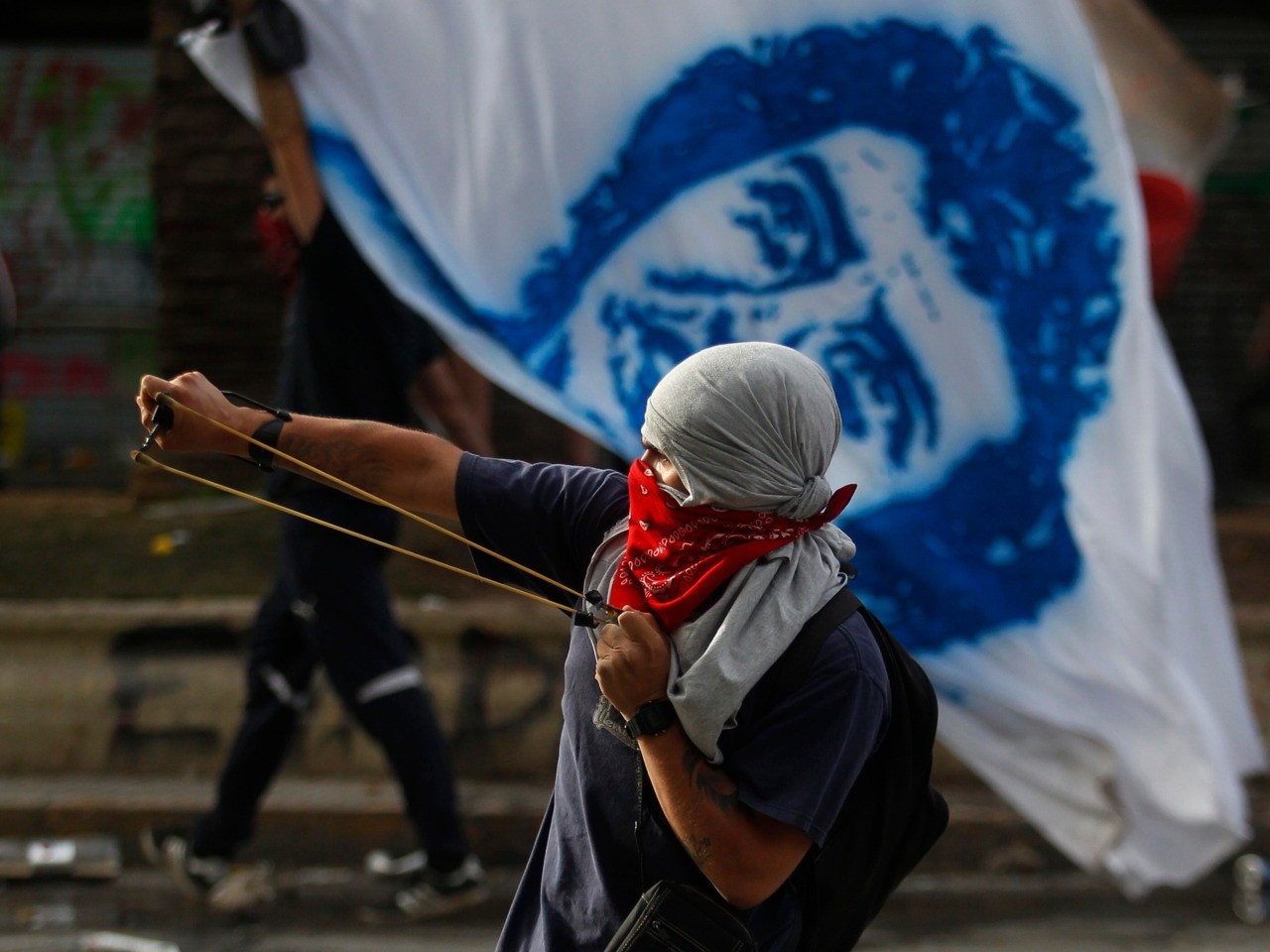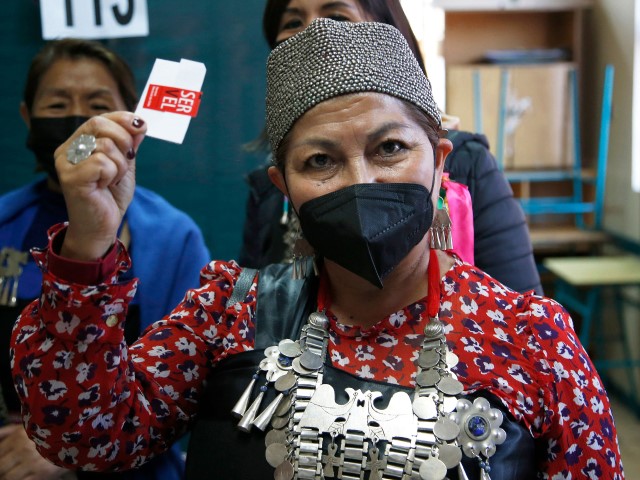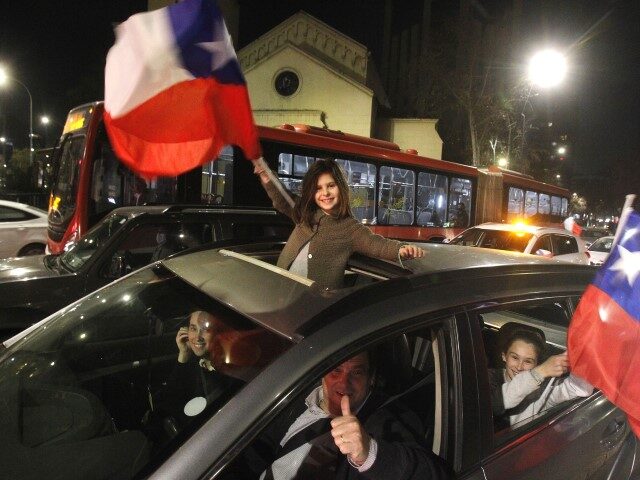With 99.9 percent of the votes counted, the official results of Chile’s Electoral Service office indicated 61.86 percent of the electorate voted to reject a proposed constitution against 38.14 percent who voted in favor of adopting it.
While polls forecast the proposed constitution would be rejected in the September 4 election, the final defeat far exceeded earlier projections. Participation in the vote was mandatory for the Chilean electorate.
The rejection of the proposed constitution completed a long political struggle that began in 2019, when a movement of leftist rioters protested against a US $0.04 public transit fare hike, then moved on to demanding a complete replacement of Chile’s 42-year old constitution, implemented during the dictatorship of Augusto Pinochet in 1980 and amended 31 times.

A demonstrator clashes with riot police during the fifth day of protests against President Sebastian Piñera on October 22, 2019, in Santiago, Chile. After President Sebastian Piñera suspended the 3.5% subway fare hike and declared the state of emergency, protests developed into looting and arson, generating chaos in Santiago, Valparaiso, and a dozen other cities, resulting in at least 15 dead and over 2000 arrested. (Marcelo Hernandez/Getty Images)
In 2020, during the government of center-right former President Sebastian Piñera, Chileans participated in a referendum to determine if the country should begin a Constitutional Convention process. 78.31 percent of the Chilean electorate agreed to carry out the constitutional convention proceedings, and subsequently elected far-left President Gabriel Boric, one of the main leading figures pushing to reform Chile’s constitution.
Despite their overwhelming victory in the vote to begin the Constitutional Convention process in Chile, leftist rioters still carried out acts of violence and vandalism.
Once installed, the predominantly leftist Chilean Constitutional Convention drafted a proposal composed of 388 articles, which was hailed by left-wingers around the world as the “most progressive” document of its kind.

Former President of Chile’s Constitutional Convention, Elisa Loncon, casts her vote during a referendum to approve or reject a new Constitution at a polling station in Santiago, on September 4, 2022. (CLAUDIO REYES/AFP via Getty Images)
The draft constitution included several far-left elements that contributed to its rejection despite the initial overwhelming support, such as declaring Chile a “plurinational” and “ecological” state – with “green” and climate change-related policies present in 98 of its 388 articles – the elimination of the nation’s 200-year old Senate, radical changes to Chile’s current justice system, and the decriminalization of abortion at a constitutional level.
Shortly after the official results were announced, Chileans flocked to the streets to celebrate the rejection of the far-left constitutional proposal, waving the nation’s flag and singing Chile’s national anthem.
Cantando el himno nacional: celebración por triunfo del rechazo
 📡 EN VIVO ➡️  https://t.co/XJmaMtgTIz
 ⭕️Minuto a minuto ➡️ https://t.co/le5E6yCZjc pic.twitter.com/tLQM1o7gIE
— 24 Horas (@24HorasTVN) September 5, 2022
In the interview below, Pinera-era minister Karla Rubilar remarked that Chileans rejected the extremist constitution because they believe a few people should not impose their beliefs on the entire nation:
#CNNPlebiscito | Estamos en terreno, en la comuna de Las Condes Carabineros informa sobre desvíos a propósito de la celebración por triunfo del Rechazo
🗳️Resultados: https://t.co/UG7NI1rDuW
📱Señal YouTube: https://t.co/gCj3fxBI26 pic.twitter.com/GMEA0YXfIn— CNN Chile (@CNNChile) September 5, 2022
President Gabriel Boric addressed the nation on Sunday, acknowledging that voters were “not satisfied with the proposed constitution that the convention presented to Chile, and therefore decided to clearly reject it at the polls.”
Boric also announced that he would work to present a new constitutional proposal for approval via referendum, and that he would make changes in his current cabinet.
“This decision by Chilean men and women requires our institutions and political actors to work harder, with more dialogue, with more respect and care, until we arrive at a proposal that interprets us all, that is trustworthy, that unites us as a country,” Boric said in a presidential address on Sunday.
Boric also sent a letter to the heads of Chile’s political parties prior to the announcement of the results, inviting them to meet and continue the constitutional process, as all projections pointed to an overwhelming rejection of the current proposal.
The rejected constitutional proposal won support from far-left political figures around the world, including Rep. Rashida Tlaib (D-MI), author Noam Chomsky, and Britain Labor Party leader Jeremy Corbyn. It was also promoted by Hollywood celebrities such as Mark Ruffalo and Chilean-American actor Pedro Pascal.
Chile's #NuevaConstitución will provide greater support for climate justice and democracy. This could help change the tide. #AprobarEsHumano ❤️ https://t.co/6X5dMjdCfn
— Mark Ruffalo (@MarkRuffalo) August 31, 2022
Gustavo Petro, Colombia’s new far-left president, was among the first to lament the rejection of Chile’s constitutional proposal, by tweeting “Pinochet revived” when the election results were made public.

COMMENTS
Please let us know if you're having issues with commenting.